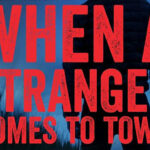Home »

Community engagement and collaboration with the RCMP
Part One
By Carol Gordon
COMMUNITY ENGAGEMENT AND COLLABORATION
The following excerpts were taken from an interview with Columbia Valley RCMP Detachment’s Sgt. Bob Vatamaniuck, conducted January 17.

“Police work is an interesting dynamic in any community. I’ve been a member (of the RCMP) for over 20 years. We are interested in the civil liberties of members of the community, and it’s our job to take that role, at least I believe anyway, very seriously. So before I start to impact the civil liberties of the people of the community, I want to make sure that there’s enough evidence, and that the information is corroborated (confirm or give support to a statement, theory, or finding) as best as possible, before I take enforcement action, and really affect the civil liberties of whoever is being accused of a certain crime.
“There are 11 (RCMP) members here. (The number) is based on the population size of the community. (They are) 11 general contractors who know a little bit about everything and basically, do it all. We are members of the community. We share the same grocery stores, we share the same facilities, we share the same concerns, our children share the same schools.
“(To engage with the community), I attend meetings consistently and constantly, and I document those meetings, and I meet people, and I form new relationships, form new works, and I embrace those and try to foster those the best I can. So when there is a need for RCMP engagement, they feel free to contact me and ask me questions, just like you do. (I) try to foster those relationships,” said Sgt. Vatamaniuck, who has been Columbia Valley RCMP Detachment commander for about 18 months.
“I get calls very consistently, not only from elected officials but from community members, every corner of the social network. I get calls from community groups, more or less it’s just asking me questions, and it’s the approachability.
“They want to know what can be done about this. We have an open dialogue about that, about what the expectations are, and we (RCMP) try to make ourselves available as best we can to answer those questions and be there for the community and to make sure that they feel comfortable in the community and that they enjoy living here, and if they have a public safety concern, they feel open enough and feel safe enough that they can confide that in their police service.
 “As members of the RCMP we try to facilitate our mission, vision and values with community spirit (see the photo to the right of the RCMP Community Policing sign which appears in Invermere’s RCMP headquarters). They try to get the same personalities in leadership roles in each detachment, so not only to engage with the community but to be an example for the rest of the members of the force.
“As members of the RCMP we try to facilitate our mission, vision and values with community spirit (see the photo to the right of the RCMP Community Policing sign which appears in Invermere’s RCMP headquarters). They try to get the same personalities in leadership roles in each detachment, so not only to engage with the community but to be an example for the rest of the members of the force.
“So we have all met those RCMP members, and it’s not just unique to RCMP, who aren’t as open-minded and collaboratively minded as many others, but you hope that you and the people who you work with are polite and respectful to the public. You aren’t going to please all the people all the time, and we do the best we can. If there’s a personality issue, it’s up to the community; it’s up to the elected officials to make that known to the RCMP so that they can say that ‘you either need to make a change or you need to make a change of attitude.’
“I have been here in the Columbia Valley a short time, but it’s had a huge impact on my perception of the public. Of my 21 years in the RCMP, 15 of those were in plain clothes, in organized crime, homicide investigations, bank robberies, serious sex assaults, so I never really had that much interaction with the public. What would happen is there would be an event, I would come in with my team, and we would investigate it, and we would go back to the headquarter building. I wouldn’t be in front of a mayor and council; I wouldn’t be in front of a community group.
“So when I took this role, it was new to me. I thought, (what) is the public perception of the RCMP these days because I was kind of disengaged or separated a couple of degrees. I have to say that I was overwhelmingly surprised at how wonderful people are – welcoming – and how accepting they are and how they like a good sense of humour and how they have a relaxed lifestyle that they don’t want impacted by crime. We do our best to mitigate (make less severe, serious or painful) those. When they are impacted, I do get phone calls.
“Let’s just give an example here. Somebody’s driving through Kootenay National Park, and they get passed in a very dangerous manner, and they are mad at the RCMP that there was no cop there when this happened and why aren’t we out there more.
“Well, we have 22,000 square kilometres that we cover here, and we have 11 members. At any given time there is one in training, there’s one with a broken leg, a couple of people that are on holidays, so I really have two or three members on at one time. That’s a huge area for two or three members at any given time. So if you see a member, it can be like seeing an albino moose.”
BE A GOOD WITNESS
Sgt. Vatamaniuck, who will be leaving the valley soon due to a promotion, said one area the public can help police with is “being a good witness for us. If you’re that affected and impacted by some kind of activity, whether it be a traffic offence, whether it be somebody who is verbally assaultive or uttering threats or you see an assault, all we ask is you be a good witness, and you come forward, and you tell us about it.
“If you see something and it affects you, impacts you, if it keeps you up at night, be a good witness. What I mean by that; make notes of what you’ve seen, time of day, the day of the week, date, what this person was wearing, what that person was wearing, what that person said and what that person said. Try to write those things down because if you try to call or speak to a cop after five days, you’re not going to remember those specifics. And heaven forbid that some charges get laid, and it’s in court 24 months from now, you’re not going to remember a lot of those things. I really ask that people make notes.
“If it’s a traffic offence and you can get a license plate, then (it) bodes so well for just any kind of investigation, whether we just give a verbal talking to the registered owner or we give a violation ticket. We weren’t there so we need people to convey what they witnessed, convey the impact it had on them and insist the police take action and we will.”
COLLABORATE WITH THE RCMP
“If you’re comfortable with going to court, let’s say it’s a traffic offence and someone’s passed you on a double solid line doing 210 kilometres an hour. If it were that dangerous and impacted you that much, then I really suggest you provide a statement describing exactly the time of day, road conditions, what you saw, the license plate and who was driving. And if they dispute the ticket, because a ticket will be issued, you will have to go to court and identify yourself as a witness.
“Now if we’re talking about subversive activity in the community like drug trafficking, there are numbers of ways to collaborate with the police.
“One is just through Crime Stoppers, and that’s probably the easiest one because you’re made anonymous, you never get spoken to by the police. Crime Stoppers is an independent organization that is not puppeteered by any police organization. It’s puppeteered by the province, and they have their own funding matrix, and so there is no control of Crime Stoppers by the police. The information you are providing is anonymous and is sent to a police jurisdiction and is corroborated (support the information that is given) as best we can. If there’s enough there, we’ll take enforcement action. But in any event, it’s intelligence (the collection of information of military or political value) that police wouldn’t ordinarily be receiving.
“Another way is if you’re involved in that subculture of drug activity, you can give what’s called ‘Privilege in the court system’ and that is, what you tell the police is privilege. The police will take that information, they will corroborate it best they can, and they will work with crown prosecutors in protecting that identity. It’s just a corroboration of police alone, from that information that you provided, is evidence enough, so you don’t have to go to court and identify yourself. So there are all kinds of avenues for the Police to travel in that arena of covert (not openly shown, engaged in, or avowed: veiled) information.
“These are confidential informants. We would work with them in being confidential informants for the RCMP. So we would have a relationship. He would come out and provide us with information. We may give him some money back for that information, and he or she may become a paid informant.
“There are a lot of fears, but when people are involved in the drug culture, and somehow they’ve been impacted significantly by a certain drug dealer, or they want to make a change in lifestyle, then they’ll sometimes come and work with the RCMP in a covert nature. Or they’re in it, and they want to get out, or sometimes it’s just financial compensation. So there are several kinds of motivators.
“So what I want people to be aware of is that the police need more than rumours. They need to know the difference between rumours and facts. How do you know it specifically? What the police need is somebody that has intimate knowledge about those events themselves.
“They should call us (250-342-9292; during an emergency dial 911), as soon as they can so that they can keep that information fresh and (so that) we can collect that evidence and that information as soon as we can because there is an expiration date on it. It does spoil after a certain amount of time. So the sooner the average person is impacted by some kind of event that (has them) really impacted and mad, and (is feeling that) something needs to be done, we ask that they call the RCMP right away so that information stays fresh.
“They can call us and we can meet with them or talk over the phone and see if it’s relevant information and significant information that needs to be developed further.
“Police work is never black and white. We get in this grey area of corroborating evidence, this grey area of information acquisition and the grey area of civil liberty infringement. The Charter of Rights and Freedoms really prevents us as agents of the state to go and just arbitrarily kick doors and just arbitrarily put people in jail.
“We really try to work with the community and resolve things on a relatively informal level,” Sgt. Vatamaniuck related.
Part two – Fentanyl is a social crisis – who is responsible for the solution? will be published next week.
e-KNOW







